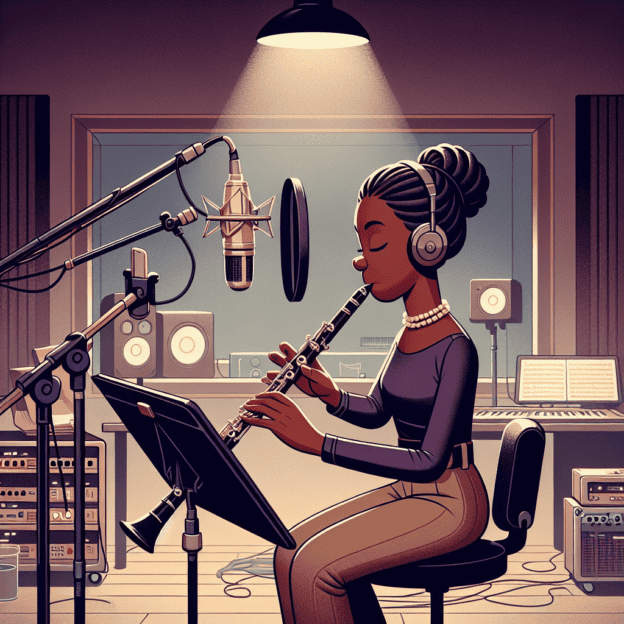The Clarinet in Film Music: A Melodious Journey
The clarinet's distinctive tone has added magic to countless movie moments. Let's explore the history and mystery of the clarinet in film music, while understanding some copyright considerations associated with it. Martin Freres, a respected name among clarinet brands, has long been part of this musical journey.
The Importance of Film Music
Film music, also known as film scoring, plays a vital role in the cinematic experience. Picture iconic film scenes without their memorable soundtracks—they'd lose much of their emotional impact. The clarinet, with its range of sound textures from mellow and haunting to playful and bold, is a go-to instrument for creating diverse moods and storytelling in film.
The Clarinet's Role in Film Music History
The clarinet's part in film music history is rich and captivating. A standout example is Benny Goodman's clarinet solos in “The Gang's All Here” (1943). Goodman's style bridged jazz and classical music, adding depth to the film's soundtrack. In more recent times, the clarinet's sorrowful voice in “Schindler's List” (1993) became a powerful auditory symbol of the film's emotional weight.
| Year | Film | Clarinet's Role |
|---|---|---|
| 1943 | The Gang's All Here | Benny Goodman's jazz-classical fusion solos |
| 1993 | Schindler's List | Mournful cry symbolizing sorrow and gravity |
Copyright Considerations in Film Music
Creating music for films involves more than just composition; it also requires understanding copyright rules. Composers using clarinets in their scores must secure the right to distribute and perform their compositions. This involves obtaining synchronization (sync) rights, which allow music to be combined with visual media like films, TV shows, or commercials. For instance, John Williams, who composed the score for “Schindler's List,” would have needed sync rights for each clarinet music segment used in the film.
Understanding Performance Rights
Performance rights are another key aspect, covering the public performance of music. These rights are typically managed by performance rights organizations (PROs) such as ASCAP, BMI, or PRS for Music in the UK. Clarinet pieces, whether played live or pre-recorded, fall under these rights. Most film production companies have comprehensive licenses with PROs, covering the use of music within their productions.
Honing Technical Skills for Film Scoring
While legal considerations are important, clarinetists must also refine their technical skills for film scoring. Breath control is essential. Regular practice of long tones and dynamic exercises can significantly improve control, a key element for performing the expressive lines often required in film music. Mastering legato and staccato articulation ensures notes connect smoothly or sharply as needed, creating the intended emotional effect.
Recording Techniques for Film
When recording clarinet for film, microphone placement greatly affects the captured sound. Condenser microphones are often used, positioned about 6–12 inches from the clarinet's bell, angled slightly upward to capture the instrument's full resonance. Using pop filters can help reduce unwanted noise, resulting in clean, crisp recordings.
Embracing Digital Tools
Clarinetists should also become familiar with digital audio workstations (DAWs) like Pro Tools or Logic Pro. These tools allow musicians to edit and perfect their performances, ensuring each note aligns perfectly with the film's visual narrative. Understanding MIDI interfaces can also be helpful, especially when blending electronic elements with traditional clarinet sounds.
Expanding Your Knowledge
For those keen to explore the intersection of music and cinema further, studying music theory, audio engineering, and even some legal aspects can be valuable. Participating in film scoring workshops and joining discussions in forums dedicated to film music composition can provide great insights. Remember, practicing with well-known scores can offer both inspiration and practical understanding of film music requirements.
The Clarinet's Lasting Impact
The clarinet's rich, versatile sound continues to shape film music. From classic scores to modern blockbusters, its influence is clear. By developing your skills and understanding musical rights, you can contribute to this dynamic art form, much like Martin Freres clarinets have done for generations.
To aspiring clarinetists and music lovers, may your musical journey be as moving and powerful as the films you dream of scoring!
Table of Contents
- The Clarinet in Film Music: A Melodious Journey
- The Importance of Film Music
- The Clarinet's Role in Film Music History
- Copyright Considerations in Film Music
- Understanding Performance Rights
- Honing Technical Skills for Film Scoring
- Recording Techniques for Film
- Embracing Digital Tools
- Expanding Your Knowledge
- The Clarinet's Lasting Impact







